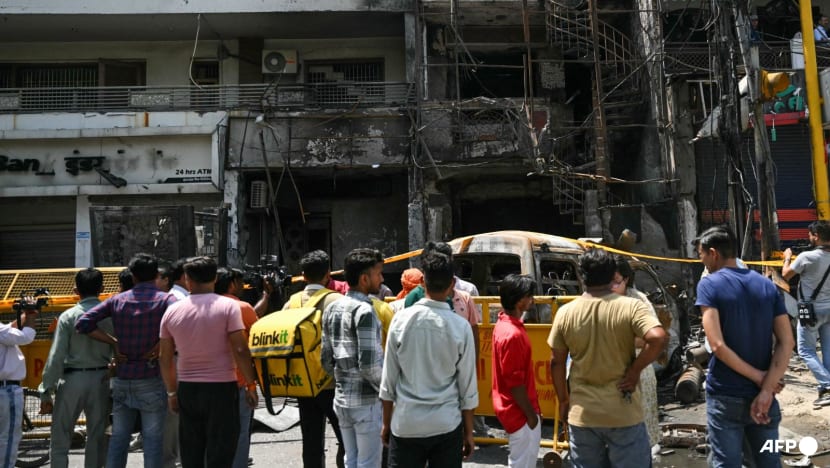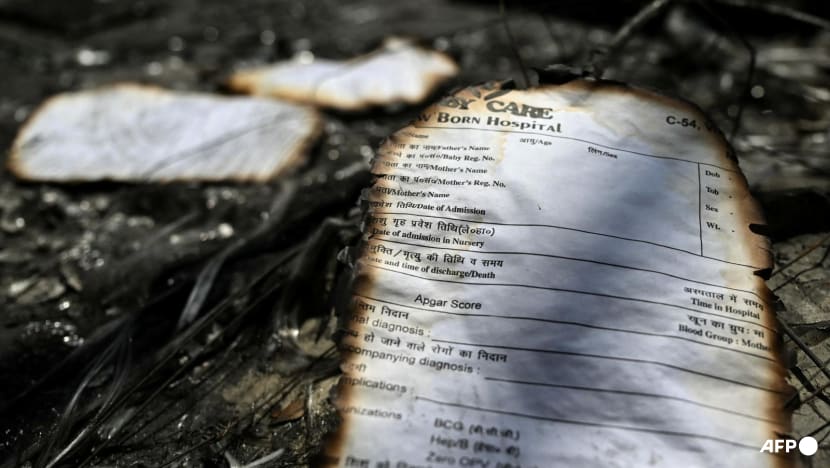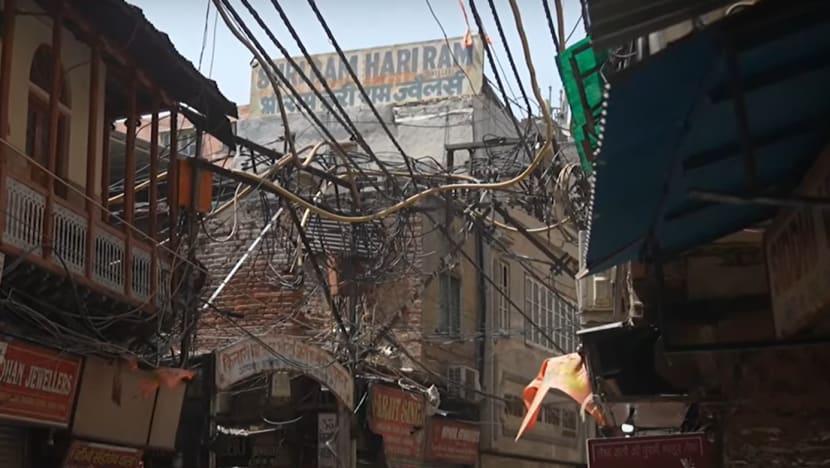India heatwave sparks spate of fires, ignites calls for stricter safety regulation enforcement
More than 300 fires have been reported in the Indian capital of New Delhi so far this year – many of them deadly.

Men gather near the remains of an accident site a day after fire blazed through a children's hospital in New Delhi on May 26, 2024. (Photo: AFP/Arun Sankar)

This audio is generated by an AI tool.
NEW DELHI: India has no lack of fire safety regulations, but blazes have been sweeping across the country partly due to a rampant disregard of fire codes as well as poor planning and low awareness.
Analysts said heavy power demand in the summer and a lack of firefighting tools are also problems that have never been properly dealt with.
Authorities will have to invest hundreds of millions of dollars to upgrade infrastructure, added the experts, while residents must educate themselves about the risks.
Large swathes of the world’s most populous country have been sweltering in an extreme heatwave in recent months.
This has led to a spate of building and forest fires, with more than 300 cases reported in capital New Delhi so far this year – many of them deadly.
The crisis is now leading to urgent calls for stricter enforcement of regulations.
FIRE CLAIMED SIX NEWBORNS’ LIVES
Last month, a fire at a paediatric hospital in New Delhi claimed the lives of six newborn babies. An oxygen cylinder had exploded, reducing parts of the building to rubble and trapping 12 children along with close to a dozen staff.
Officials later uncovered building code violations, a lack of trained staff, and no firefighting tools.
As the fire engulfed the hospital, those in neighbouring buildings also feared for their own safety.
“Just this one wall separates this office from the hospital,” boutique owner Archana Parikh told CNA. “We rushed outside. By then we’d already heard four blasts.”
Ms Parikh owns Mohini Boutique, which was damaged by shockwaves from the blast. She lost more than US$12,000 – half a year of earnings – in repairs for her shop.
She had been reluctant to put in fire safety measures but the impact of the blaze has changed her mind. She now plans to install fire hydrants, as well as train herself and her staff in safety precautions.
“We’re now going to be a lot more careful. I think it’s by God’s will that my shop survived … These clothes could have caught fire and the whole place could have been destroyed,” she added.

IMPLEMENTATION OF POLICIES
India’s safety regulations include requiring appropriate fire exits, the presence of extinguishers, and even a limit on the height of buildings to ensure fire fighters can reach rooftops.
But analysts said the implementation of these policies and plans is where the problem lies.
“A lot of areas in Delhi, for example, are unplanned. That definitely is a cause for concern because unplanned areas don’t have necessary space for access and ventilation. Providing post-hazard relief is difficult over there,” said urban planner Adarsh Kapoor.
Officials across the country have arrested several people for flouting fire safety laws.
Criss-crossing overhead power cables have also become a common sight in many parts of India. They can quickly become fuses for fires and are more prone to damage out in the open.

MORE THAN 300 FIRE CALLS THIS YEAR
Meanwhile, soaring temperatures have further heightened the risks of infernos.
From January to June this year, fire stations in Delhi have responded to more than 330 calls. In comparison, they responded to 550 calls in the whole of last year.
The heatwave this year, with temperatures regularly rising past 45 degrees Celsius, has sent Delhi’s power consumption through the roof.
Mr Kapoor said that air-conditioning units and electricity wires can fail when ambient air temperatures start rising.
“The same can happen with transformers, because you have too many air-conditioning units running on transformers, and the transformers are not equipped to take so much load. They will surely burn out,” he added.
Many residents worry that worse blazes are imminent.
“Officials will only wake up when there is a big incident. Before that, they go about minding their own business,” New Delhi resident Bhoora Singh told CNA.
“Only when something big happens will they gather to act. (A few days) later, they will once again forget all about safety,” he added.
















